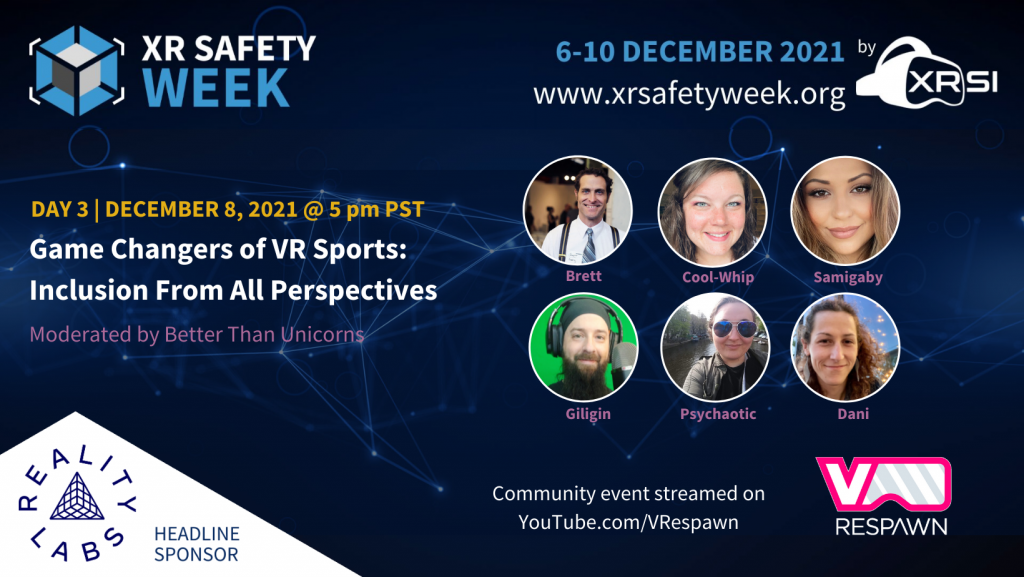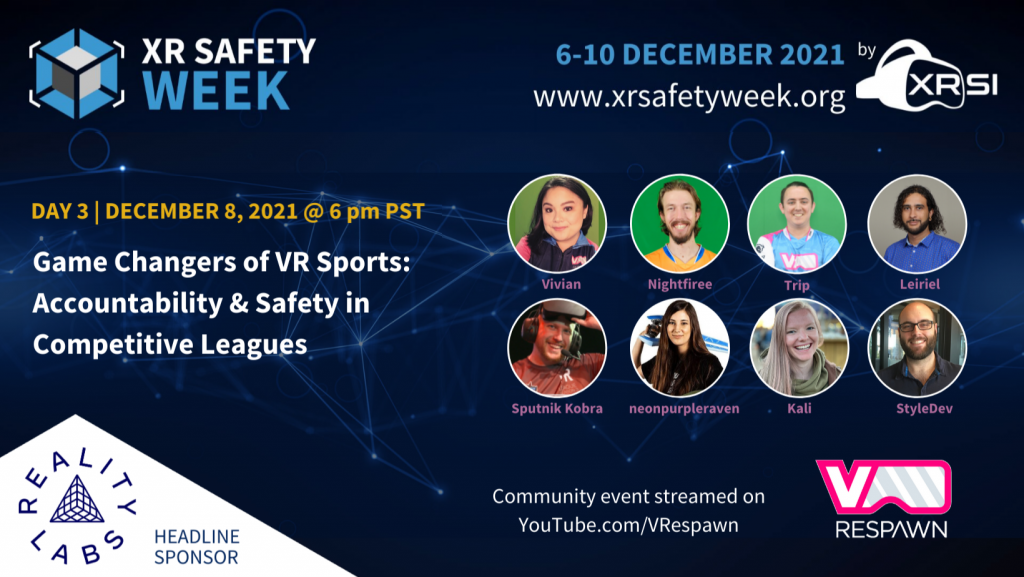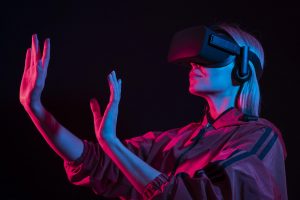DAY 1 - DECEMBER 6, 2021
Immersive Storytelling & Journalism
Opening Event: XR Safety is a Shared Responsibility
In the opening session of XR Safety Week, world-class journalist Laurie Segall interviews the founder and CEO of XRSI, Kavya Pearlman.
From topic to medium – XR for journalism
There is a long way to go before using Virtual and Augmented reality as media. Today, XR is widely considered a topic for news more than a platform, and this will require a paradigm shift.
Nevertheless, there are immediate potential uses for XR in journalism.
Think about data: for many decades, we’ve been dealing with almost linear growth of data available for news reporting. Then, with the Internet mass adoption, the amount of data started to grow exponentially, and today it’s basically unlimited for quantity and quality. So, why are we still using pie graphs?
Adam Marton, Director of the Capital News Service Data and Graphics Bureau and Lecturer within the Philip Merrill College of Journalism (University of Maryland) will chat with Marco Magnano, co-founder of XRSI and foreign policy journalist, about what we have today and where we could go in the field of immersive news reporting.
It’s (not) just a game!
Are video games “just” games?
The debate is probably as old as video games themselves, and probably the only correct answer is “who cares”?
What’s for sure is that video games, or at least their mechanisms, are everywhere in our lives, and they can help us deal with various challenges, from education to tourism, from finance to… gaming!
Beyond gadgets: how to report about the Metaverse?
In recent months the word “Metaverse” has become one of the most used (and abused) terms in the tech industry.
We’ve also heard or read that the Metaverse is going to replace the Internet and maybe we’re all supposed to live there. And we also heard that a very big corporation changed its name to Meta, promising to build “the” (or “a”) Metaverse.
Truth is, the Metaverse is not a simple concept to explain for many reasons. One of them is that it doesn’t necessarily exist. Or maybe it’s already here and we didn’t notice. And should we call it “Metaverse”?
Three voices, three avatars, three experts will join XRSI’s cofounder and journalist Marco Magnano to dig deeper into these questions: Tom Ffiske (The Immersive Wire), Doug Thompson (Bureau of Bright Ideas), and Antony Vitillo (SkarredGhost) will give names to things and tell everyone how they are telling stories about a world that we’re immersing into.
Immersive Storytelling: Learning from Games to Guide the Future
Join Ben Bowman for a discussion surrounding the powerful interactive storytelling approaches in video games that we have seen evolve over the past few decades to learn how we can view use their concepts to drive our storytelling in the future, and the considerations they bring for user safety and privacy in the XR space
Virtual Perspectives, Real Outcomes
In this seminar, Laura will leverage multiple industry-based case studies of how Storytelling in XR is being used to facilitate empathy development, perspective-sharing, and human-centered problem-solving.
The learning objective of the session is to better understand how to leverage storytelling in XR as a tool for solving complex problems. Prerequisite knowledge & experience in Production/Development or Education helpful, but not necessary.
DAY 2 - DECEMBER 7, 2021
Child Safety
Immersive Digital Therapeutics and Child Safety
Lucia Pannese is CEO & Founder of Milan-based Imaginary, a leading European Serious Games development company specialing in digital health applications. Imaginary has developed a comprehensive range of games-based digital therapeutic solutions to tackle global challenges such as obesity, autism, rehabilitation, and life-changing conditions such as cystic fibrosis.
Lucia’s talk will cover some case studies of digital game-based health solutions for children, based on her European research projects. She will discuss how safety issues are handled in the development of these solutions by her multidisciplinary team.
Safe Guarding your Child’s Mental Health within the Metaverse with MIQ (Metaverse Intelligence Quotient)
MI-Q Metaverse Intelligence Quotient
The rapid proliferation of technology in our society has increased concerns around mental health. According to the research, social media increased the risk for depression, anxiety, loneliness, and self-harm. Let’s take that one step further and look at esports and the metaverse.
Due to the rise of gaming and esports, a new condition has been coined called internet gaming disorder. Gaming disorder was defined as a “pattern of gaming behavior (digital-gaming or video-gaming) characterized by impaired control over gaming, increasing priority given to gaming over other activities to the extent that gaming takes precedence over other interests and daily activities, and continuation or escalation of gaming despite the occurrence of negative consequences.”
As with anything new, the Metaverse creates a level of uncertainty and will introduce unforeseen challenges that disrupt our current way of life and the way we engage in and outside of this new environment.
Again, the Metaverse has the opportunity to introduce a multiverse that will usher in a host of new situations and scenarios that our children have not experienced. Today our children struggle with Emotional Intelligence, Cultural Intelligence, and Social Awareness. These mental concerns will only accelerate if we do not apply safety guidelines and use a Metaverse Intelligence Quotient.
I’d like to introduce a new type of intelligence that will be critical as we look to create virtual, physical, and psychological safety inside of the Metaverse. The Metaverse Intelligence Quotient or what we call the “MI-Q” is grounded in the principles of AWARENESS, INCLUSIVENESS, RESPECT & EMPATHY. These A.I.R.E factors are the four pillars that make up the MI Q which I will discuss during my keynote.
Once MI-Q is applied by children while in the Metaverse there will be positive results and less opportunity for mental health issues to continue among children. Cultivating positive experiences within the metaverse by applying these four pillars will generate the protection our children need in order to thrive in this alternative world.
Safety in XRPT: Extended Reality Play Therapy
Extended reality has begun to blossom within numerous environments, including in the mental health treatment of children and adolescents. Applying the fundamental tenets of an approach such as play therapy, a mental health practitioner can offer highly motivating, immersive, fun, and powerful interventions within which they can connect, assess, educate, and intervene. Safety in XRPT provides practitioners with a collection of brief topics to pique interest and inspire them to learn and do more.
Key topics:
- Digital tools in therapy
- Ethics
- Protections
- Therapeutic use
- Case examples
- Potential solutions for developers specific to MH treatment use
Education in the Mirror World
What it will be like to be a kid learning in the Mirror World/Metaverse?
What experiences do we want our kids to have and what technological hurdles must we overcome to make them a reality?
The Future of Child Safety in XR & the need for Metaverse IQ Workshop
Join Shea Richburg and Raulvin Coke Co-founders of Future Wise Group for a workshop on The Future of Child Mental Health in the Metaverse. During the session, the founders will discuss the importance of maintaining positive mental health by establishing what they have coined as Metaverse IQ or MIQ. The mini presentation will be followed by a breakout session where the attendees will have the opportunity to contribute ideas to establish the pillars of the Metaverse IQ. Followed by debriefing on the breakout session and a conversation about the next steps to the codification of the MIQ.
At the conclusion of the workshop, attendees will have a clear understanding of possible mental factors attributed to being in the Metaverse, how to apply the MIQ to a child’s daily interaction within the Metaverse, and the positive results when applying the MIQ.
DAY 3 - DECEMBER 8, 2021
Diversity & Inclusion
Avatars, virtual harassment, and XR safety challenges in Higher-Education
Over the next few years, XR is bound to significantly impact higher education by changing how students learn, supporting new modes of distributed/hybrid learning experiences at scale, and developing empathy. This adaption will also result in the education community facing a new set of critical security, privacy, safety, and ethical challenges.
Our panel discussion will explore some of these challenges. Drawing from the experiences with XR adoption at our respective institutions and collaborating with industry partners, we will share insights and discuss recommendations regarding how to navigate some of the challenges embodying avatars in virtual spaces.
Evangelizing Diverse Communities to the Metaverse
The industries that form the foundation of the Metaverse, gaming and XR, have historically neglected their women and minority audiences. Now that the Metaverse is here, we all need to come together and make this industry and our future more inclusive, diverse and equitable. Our panel speakers bring their perspective on these issues and solutions, gathered from their experiences walking the halls of academica to leading discussions in boardrooms and inspiring the underrepresented youth of New York. You will be hearing their observations of what’s currently lacking in the industry, how they’re evangelizing these communities to the metaverse, and some tangible takeaways to use as you co-create and collaborate in the Metaverse.
A VR Lab in the middle of the Atlantic Ocean
Gonçalo Pratas talks about how and why to build a VR Lab in the middle of the Atlantic Ocean
Game Changers of VR Sports: Inclusion From All Perspectives
The panelists will discuss their roles from starting out as competitive players to becoming leaders in one of the biggest competitive communities in VR. Brett, of Better Than Unicorns, will moderate the panelist as they discuss their thought process and innovative ways of creating diverse and inclusive opportunities, as well as addressing toxic behavior often found in gaming. How will the metaverse be better in VR sports? These experts will show you!

Game Changers of VR Sports: Accountability & Safety in Competitive Leagues
Accountability & Safety in Competitive Leagues: It’s not just a game when it comes to ensuring a safe and fair league in VR sports. On this panel, the leading organizers of six different VR leagues will share ways they protect their communities while upholding the integrity and the spirit of competition. Learn from more structured leagues designed for students in high school and college, as well as the leagues open to everyone; both remote and in-person.

DAY 4 - DECEMBER 9, 2021
Medical XR & Immersive Healthcare
The Promise, Opportunities, and Risk of Medical XR
The future landscape of Medical Extended Reality will enable enormous breakthroughs in our ability to provide access to healthcare, to treat and diagnose people, and provide immersive tools for medical education. It also provides unprecedented access to the most sensitive data that can be collected. What are the promises of Medical XR, and how might we imagine a reality in which data rights and civil liberties might be balanced against training, treatment and access?
Healthcare Simulation and Training
Medical education is undergoing a paradigm shift accelerated by the pandemic to adapt existing curricula to accommodate XR. The talk will discuss how training, simulation, and remote collaboration could potentially be disrupted.
Accelerating the adoption of XR to support health care education in England within NHS
The use of Extended Reality (XR) technologies such as Virtual Reality (VR) and Augmented Reality (AR) have become an invaluable part of the delivery of education and training in healthcare during the Covid-19 pandemic.
Clinical experiences and clinical placements are an essential part of medical and clinical training in the United Kingdom. Many of these physical experiences had to be stopped when the pandemic arrived, causing significant disruption to health and care trainees.
From virtual ward rounds and virtual surgery using Microsoft HoloLens, Team-based scenarios in VR, and holographic anatomy training, XR technologies became an important part of the training process for the health and care workforce, to continue to deliver these clinical experiences.
In this presentation, Dr. Neil Ralph, Head of the HEE Technology Enhanced Learning at Health Education England will discuss how the team is supporting the training recovery at scale, through innovative policy, the rollout of “XR Hubs”, IT infrastructure, and faculty development.
Creating a world-class ecosystem for XR in the NHS
Following the launch of the Growing Value of XR in the Healthcare Report, the UK has begun developing a united strategy for deploying XR across the NHS. Join the discussion and hear from expert representatives who will share the existing activity across the UK, plans for further strategic development, and opportunities for global collaboration.
Physiotherapy, Psychotherapy, and beyond
In whatever form, therapy should ultimately be focused on giving back autonomy and self-determination to people. Does XR encourage more active participation in therapy as opposed to more passive forms of treatment? What are the advantages, limits, and risks of using immersive technologies as part of treatment, and to what degree can they safely replace traditional therapy?
Finally, what benefits might data collection have in this context, what types of data would be collected, and how can this be done safely without violating the rights of users.
With Great Power Comes Great Responsibility
With all of the capabilities of XR – stopping pain, replacing LSD treatments, physically healing, there is the capacity to cause great harm.
Any developer with Unity could potentially misuse XR either intentionally or unintentionally. In this talk, we explore ways that developers could harm patients with this powerful medium in order to understand how to anticipate and prevent it.
DAY 5 - DECEMBER 10, 2021
Privacy & Safety
Digital Human Rights Day
Privacy and Ethics overview on the Metaverse
in partnership with APEE – Associação Portuguesa de Ética Empresarial
The panelists will foster a discussion over the ethical challenges for individuals and companies in the Metaverse.
PARTICIPANTS
Luis Bravo Martins
CMO @ KIT-AR, Immersive tech author, speaker
Mário Parra da Silva
President at APEE
Gremlins and Guardrails: What’s next for the Metaverse?
The Metaverse poses a set of unique challenges to traditional rules-based frameworks for technology management and oversight. In this panel, three leading practitioners – from the areas of law, emerging technologies and national security, and risk management, respectively – discuss key issues and drivers for Metaverse adoption to optimize safety and soundness. Gremlins will never completely disappear, so how do we best deploy guardrails that protect and reassure us without compromising innovation and accessibility?
RoundTable – Understanding the impact of XR Data Collection on Human Rights, Work, Education and Commerce
Hosted and directed by XRSI
On December 10, we mark 73rd International Human Rights Day and celebrate the fifth and final day of XR Safety Week.
On that day, we will join a wide and global community of stakeholders to take an essential step toward safety to build brave new virtual worlds by hosting a closed-group roundtable discussion around “XR Data Classification”.
The roundtable discussion will take place on Dec 10th from 9:00 am PST to 12:00 pm PST with the following objectives:
- Share the impact of massive data collection via XR and related Emerging Technologies.
- Discuss and establish a common understanding around the various contexts in which data can help or hurt humans and potentially undermine Human Rights.
- Focus on four contexts as a starting point: Education, Work, Healthcare, and the intersection of XR with various emerging technologies (e.g., Artificial Intelligence, Brain-Computer Interfaces, etc.)
Represented Organizations include:
US Department of Veterans Affairs, Meta Inc., HP Inc., Microsoft, EFF, Access Now, Government of Australia eSafety Commissioner, IEEE, Mozilla, AARP, NHSX, National Institutes of Health, Health Education England, European Research Executive Agency established by the European Commission, Bipartisan Policy Center, Stanford University, Arizona State University, Trinity College Dublin, Georgia Institute of Technology (Georgia Tech), University of Canterbury, Dartmouth College, Goethe University Frankfurt, University of Leeds, University of Michigan, University of California, Irvine, University of Florida, University of New Haven, University of Washington, UC San Diego / Design Lab, Slingshot Simulations Ltd., Glocal Studios, The Molybdenum, Cognitive3D, Purpose Loves Company, Bowmara, YouTheData.com, Valo Health, Inc., Noboxes/SSH, RealityScience, LLC, Between Five And Nine LLC, BehaVR LLC, Realities Centre, MedVR Bootcamp and Incubator, Debbie Reynolds Consulting LLC, OviSquare, PNI Therapeutics, XRSI / NativeTrust Consulting, LLC / The Cantellus Group, Berkman Klein Center // Women in Games Argentina, Chaos Computer Club, Identity Woman & HumanFirst.Tech, Brookings, MKAI – The inclusive AI Community, Luxsonic Technologies Inc., Games4Change
Building Human Rights Into Metaverse
This event is organized by Electronic Frontier Foundation and Access Now in honor of International Human Rights Day as part of XR Safety Week.
For International Human Rights Day, EFF and AccessNow are bringing together experts and stakeholders in the fields of XR and the human rights community to address the unique risks and challenges the development of these technologies poses from a human rights perspective. This event is a participatory workshop, where attendees will be encouraged to break off into side discussions serving one central question: how do we best incorporate a human rights framework into the future development of XR technologies and future Metaverse(s). To guide these discussions we will have an introduction followed by two sessions hosted by topic experts. You do not need any prior experience in human rights issues or XR policy to attend—just an interest in both.
Event Schedule (PST): 12pm-2:45pm
Introduction (12:00-12:25pm)
- Kurt Opsahl, Deputy Executive Director and General Counsel, EFF
- Brittan Heller, International Human Rights expert, Council at Foley Hoag LLP
- Kristina Podnar, XR Safety Initiative
Interactive Roundtable (12:25-1:45pm):
Privacy, Advertising, Biometrics Inferences and Government Surveillance
Extended reality technologies (XR) provide the promise to entertain and educate, to connect and enhance our lives, and even to help advocate for our rights. But they also raise the risk of eroding those rights online. The headsets and devices can gather deeply personal information about you and the world around you, and the XR services often store this data within their servers. And by introducing artificial intelligence to XR, the privacy and security hazards are augmented, as the devices and services gather and analyze data at an unprecedented level. This session will discuss issues such as bystander privacy, biometric inferences, and advertisement in XR, as well as what level of control individuals will have over their avatar?
Facilitators
- Katitza Rodriguez, Policy Director for Global Privacy, EFF
- Daniel Leufer, Europe Policy Analyst, AccessNow
Intermission
Community Lab (2:00-2:45pm):
Interoperability, Decentralization and User-Rights in XR Technologies
It is essential to the future of human rights in the Metaverse that user and developer freedoms are not restricted by a walled-garden infrastructure. Such control can have a devastating impact on free speech, competition, and equity for those using these new technologies. This session will explore how XR can be built in an open and decentralized way to ensure platform control is not leveraged by state or private actors. In this community lab, we will address this issue from a variety of perspectives in small discussion groups, before reconvening for a final plenary session.
Facilitators:
- Micaela Mantegna, Berkman Center for Internet and Society
- Rory Mir, Grassroots Advocacy Organizer, EFF
Expert Guests
- Andreea Ion Cojocaru, co-founder, NUMENA
- Avi Ben Zeev, Chief Whateverse Officer
- Dave Mass, EFF Director of Investigations
- Gaspar Pisanu, Access Now
- Fabien Bénétou, WebXR consultant, European Parliament
- Jessica Outlaw, Founder, The Extended Mind
- Jon Callas, EFF Director of Technology Projects
- Evan Selinger, Professor of philosophy at Rochester Institute of Technology
- Matt Mahmoudi, Amnesty International
- Shaun Foster, Associate Professor of 3D Digital Design at the Rochester Institute of Technology.
- Veridiana Alimonti, EFF Associate Director for Latin American Policy
- Kurt Opsahl, EFF, Deputy Executive Director
- Dylan Urquidi, Unity Labs, Spatial Experience Architect
- Maria Sol Verniers, ArtTech Hacktivist
- Kent Bye, Voices of VR
- Camille Francois, Global Director of Trust & Safety at Niantic.
Virtual Citizens Forum
XRSI, Meta, Microsoft, and MRC are co-hosting the very first Virtual Citizen’s Forum. The forum is meant to empower creators, artists, developers, and all virtual citizens to share their success stories, their concerns, and challenges and seek real-world solutions by connecting with specific individuals and organizations that are able to address the concerns as well as celebrate the successes together with the virtual citizens of the Metaverse. Think of it as the town hall for the Metaverse where everyone comes together to exchange knowledge.






